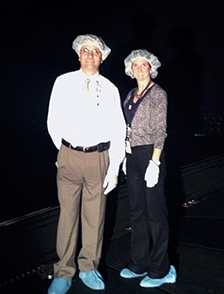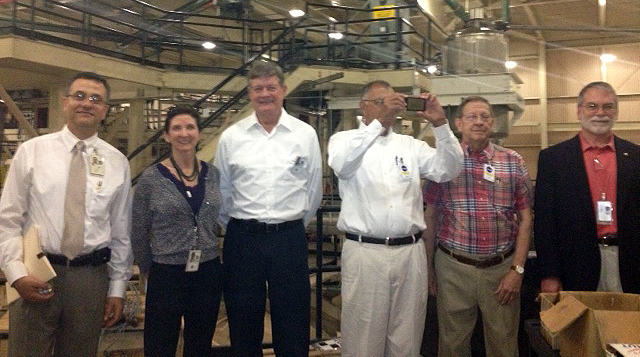Every year or so, Charlie Bolden convenes an activity to bring agency senior leadership together (albeit virtually) to share information on current topics and to gather feedback from the participants. I wanted to dedicate this blog to some of the key messages from the recent 2014 Leadership Summit that I think particularly resonate with the IPAO.
On leadership, Charlie described what he considers are the 3 most important factors a leader needs to be effective: know your stuff; know your people; and know yourself. I consider that everyone in IPAO is called to exercise leadership either as a review manager by leading one of our important reviews, as programmatic analyst leading a team of analysts performing the integrated programmatic analyses for the review; or as business professional leading a new procurement, etc…, you get the idea. So Charlie’s advice I think is very wise and relevant to us. To be effective, we need to know our stuff (and be able to communicate it well); we need to know the people in our teams; and we need to know our own strengths and limitations (we all have them) and Charlie’s advice is to be honest in our self-assessment and to address them.
Regarding effective communication, there was an insightful discussion on this topic from the Chief Scientist (Ellen Stofan). Her presentation was titled “beyond the blah, blah, blah” and related her experience as she has tried to improve communicating the scientific value of the Agency’s work to members of the Congress and other groups. She related her struggles in succinctly conveying the great scientific value of current and past programs in a straight forward manner so the appropriate support can be garnered, or as she put it, so it would pass the “so what test”. She acknowledged that most times the audience doesn’t get the significance of what we do and so she has worked with Human Capital to develop an approach to improve that communication. In think we share similar challenges in IPAO communicating the key points and downstream impacts of the results of our assessments… we need to benchmark what she has done to see if it can help us.
Human Capital Chief, Jeri Buchholz, mentioned a couple of topics of interest to us. She talked about “reverse mentoring” were a junior person mentors a senior person on items he/she may not be very familiar with (walking on somebody else’s shoes). I think there is opportunity in IPAO to do this and I think it may provide new insights. She also mentioned a couple of new awards the agency is putting in place with nominations and selection being done by peers and with rewards being are less formal (such as a ride in a prototype Moon rover). Peer recognition is one of the strongest forms of recognition. Again, I think there is opportunity in our organization to take advantage of this type of award/approach.
Lastly, Charlie also mentioned the importance of tying the organization’s work to the strategicgoals of the Agency. In that respect, the virtual summit concluded with a Mission Directorate (MD) panel where the leadership from the four MDs provided the highlights and outlook of their most important work. With the exception of the Aeronautics MD (that the Agency has not asked us to assess) the work we do in IPAO mirrors the work that was briefed to a very high degree (almost a complete match). So connecting the dots of our work with the strategic plan of the agency should be very straight forward for us. Nonetheless, I think to further reinforce it, I would like to begin sharing pictures of specific assessments, and  most importantly, of our teams involved in those. I would like to begin by sharing a couple of pictures from last year’s JWST Assessment Panel. In one of the pictures, members of the panel are in the building that houses the largest vacuum chamber in the world (Chamber A at JSC) where the JWST will undergo thermal vacuum testing to verify the integrated performance of the optics and instruments that are part of the observatory. In the other, you see a couple of familiar faces in the chamber. The panel was performing an assessment of the plans to begin that test. Now is your turn, please feel free to share any pictures that show our teams in action helping the agency carry out its most significant work!
most importantly, of our teams involved in those. I would like to begin by sharing a couple of pictures from last year’s JWST Assessment Panel. In one of the pictures, members of the panel are in the building that houses the largest vacuum chamber in the world (Chamber A at JSC) where the JWST will undergo thermal vacuum testing to verify the integrated performance of the optics and instruments that are part of the observatory. In the other, you see a couple of familiar faces in the chamber. The panel was performing an assessment of the plans to begin that test. Now is your turn, please feel free to share any pictures that show our teams in action helping the agency carry out its most significant work!
The items covered in this blog are only a small sample of the items discussed as several other discussions provided information of interest to us. I will post the agenda and briefings that had been made available in the IPAO shared folder.
As always, I welcome your thoughts on the content of the blog.


 As we gather for our last Director’s Status Review (DSR) of 2013 a look back at our activities and accomplishments this year reveals a year marked with unique challenges and opportunities. Our work plan for 2013 included several very significant “firsts” including the first PDR for the Exploration Systems Development (ESD), the first set of integrated reviews of the Joint Polar Satellite System (JPSS), and several new starts including OSIRIS-Rex, InSight, and SWOT. This year we also worked closely with the Mission Directorates to address those projects that experienced issues such as SGSS and ICESat-2. We closed out the review cycle and had the satisfaction to experience the successful flights of TDRS K, LDCM and MAVEN; all successful projects both technically and programmatically having completed development within the agency cost and schedule commitments. We continued supporting the transition through the lifecycle of several other projects and programs such as Sofia, ISS, RPS, SCAN, Orion, and ESD CP. We also continued supporting the agency by leading assessments outside of the SRB process such as the 2nd panel assessment of JWST. As you can see, the IPAO team continues to be at the very heart of the agency’s most critical work!
As we gather for our last Director’s Status Review (DSR) of 2013 a look back at our activities and accomplishments this year reveals a year marked with unique challenges and opportunities. Our work plan for 2013 included several very significant “firsts” including the first PDR for the Exploration Systems Development (ESD), the first set of integrated reviews of the Joint Polar Satellite System (JPSS), and several new starts including OSIRIS-Rex, InSight, and SWOT. This year we also worked closely with the Mission Directorates to address those projects that experienced issues such as SGSS and ICESat-2. We closed out the review cycle and had the satisfaction to experience the successful flights of TDRS K, LDCM and MAVEN; all successful projects both technically and programmatically having completed development within the agency cost and schedule commitments. We continued supporting the transition through the lifecycle of several other projects and programs such as Sofia, ISS, RPS, SCAN, Orion, and ESD CP. We also continued supporting the agency by leading assessments outside of the SRB process such as the 2nd panel assessment of JWST. As you can see, the IPAO team continues to be at the very heart of the agency’s most critical work!